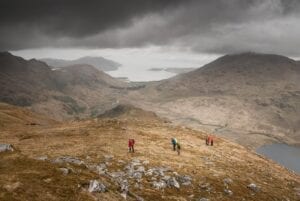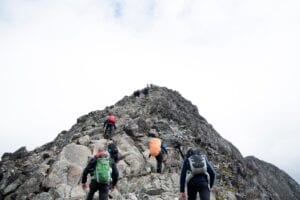The first thing to think about when looking at Training for the National 3 Peaks challenge is. “What exactly is the National 3 peaks challenge?”
The N3P challenge involves climbing the three highest mountain tops in Scotland, England and Wales within 24 hours. You’ll need to walk a total of 23 miles (37km) with a total uphill of 3064 meters (10,052ft) the whole event works out at completing the Yorkshire 3 peak’s challenge nearly two times round.
When people think about training for the National 3 peaks challenge, the only aspect many people consider is the physical side of the challenge. The slightly less glamorous side of the challenge gets overlooked. Out of the whole 24 hours, you’re going to spend a lot of that time on a mini bus. With a space not much bigger than an aeroplane seat sitting next to someone you may not know.
You’re going to both be tired of not getting much sleep as well as being potentially cold and wet. As well as looking at the physical side of training for the National 3 Peaks challenge it is also worth looking into spending some time looking at training your mindset for this challenge.
“Get comfortable being uncomfortable”
Okay great, so we know what the 3 peaks challenge involves and have a rough idea that it’s not going to be easy! Lets start training for it.
- How hard is the National 3 Peaks challenge?
- How should I train for the National 3 Peaks challenge?
- Training your mind set for the challenge
- After the National 3 Peaks challenge
How hard can it be?
For everyone, this is going to be a different answer. The question really should be “How prepared should I be for this challenge?”
When we talk about being prepared I don’t just mean your level of fitness you
 are going to need to think about your kit, food, water and mindset just to name a few.
are going to need to think about your kit, food, water and mindset just to name a few.
All of these factors come into play when you ask that question. Things like if your shoes are not broken in you’re likely to sustain blisters, consequently, your challenge is about to become a lot harder. That is a prime example of a lack of preparation for the challenge.
Take the time to look at your kit and make sure you have it sorted. 10 mins before the challenge is not the time or place to be having a meltdown because your kit is not functional.
There is no doubt that conditions in the mountains can make or break your challenge. When it is wet and cold it does make it considerably harder. This is one of those factors that you just have to accept and embrace as part of the weekend.
“Failure to prepare – prepare to fail”
Training For the National 3 peaks.
Start training as soon as you can, the more you train the more you are going to enjoy yourself. You’re also less likely to pick up an injury on the challenge because you’ve not gone from zero to hero. Your body is going to need to get used to strenuous activity for a long period of time so having good cardio and muscular endurance is key.
Don’t forget to warm up and stretch properly – things like yoga are great for building flexibility, mobility and core strength.
- Around 3 – 4 months before the challenge :
One anaerobic cardio session of about 45 – 55 mins, things like running / bike sprints are good.
One long aerobic walk on the mountains for around 5 -6 hours with a bag – get used to walking up hill with a bag. This will help to improve your overall aerobic fitness, another alternative is a long swim.
- One or 2 strength training sessions
At least 2 rest days – This is where you’ll see the improvements. Remember to recover as hard as you train.
- Around 1 -2 months before the challenge:
Time to focus on your aerobic / cardio training. Cut the strength training down to day and look at building your overall fitness up. Start to head out on the mountains and get used to moving up hill at a fast pace, this will help to mix your training up.
- Around 1 week before the challenge :
Take a small run no more than 1 hour just to keep your legs loose. Rest and eat plenty, use this time to ensure your kit is prepared. If you’ve spent time out on the mountains this time will really have paid off. You’re going to know what works and what doesn’t.
Mindset is key to any challenge.
It’s amazing what a great mindset can do on a challenge like this. Look I’m going to honest, this is not an easy challenge to do so when it gets hard don’t be surprised.
 I’m sure I speak for a lot of people out there who provide this challenge, there is nothing more frustrating then when someone says ” I didn’t think it would be this hard” … HELLO you signed up for a challenge. When it does get hard that is exactly what we came for.
I’m sure I speak for a lot of people out there who provide this challenge, there is nothing more frustrating then when someone says ” I didn’t think it would be this hard” … HELLO you signed up for a challenge. When it does get hard that is exactly what we came for.
Take a positive outlook on the whole challenge when / if you start to struggle don’t think about the whole challenge. Just think about 1 step at a time. I know it sounds cheap and a little Hollywood but it really does work. Remember the Mountain guides will be there to support you but you have to put the hard work in and give it everything. There is a great article here on mindset that will tell you more than I ever could. It’s worth giving it a read and taking some time to think about.
What now ?
Okay so you’ve done it. You’ve put the prep in, your fitness is amazing and you’re feeling fantastic so why stop there ??? Keep the training up and keep yourself active and fit. Hopefully the National 3 peaks challenge would have inspired to you to participate in more challenges. As well as spend more time in the mountains.
Best of luck with your challenge!
Lake District Adventuring is a National 3 peaks provider with an amazing success rate – We run both open bus challenges and private bookings (10 + )
Have a chat with Jack about getting a training plan set up for just £70 you can have a custom 3 peaks challenge training program that will help you get fit and strong and increase your chances of success for the 3 peaks.

